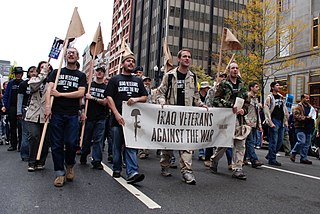
Iraq Veterans Against the War (IVAW) is an advocacy group of formerly active-duty United States military personnel, Iraq War veterans, Afghanistan War veterans, and other veterans who have served since the September 11, 2001 attacks; who were opposed to the U.S. military invasion and occupation in Iraq from 2003 to 2011. The organization advocated the immediate withdrawal of all coalition forces in Iraq, and reparations paid to the Iraqi people. It also provides support services for returning veterans to include health care and mental health.
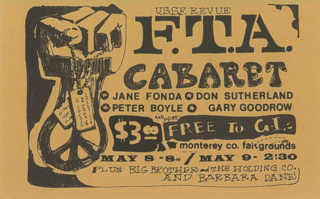
The FTA Show, a play on the common troop expression "Fuck The Army", was a 1971 anti-Vietnam War road show for GIs designed as a response to Bob Hope's patriotic and pro-war USO tour. The idea was first conceived by Howard Levy, an ex-US Army doctor who had just been released from 26 months in Fort Leavenworth military prison for refusing orders to train Green Beret medics on their way to the Vietnam War. Levy convinced actress Jane Fonda who recruited a number of actors, entertainers, musicians and others, including the actors Donald Sutherland, Peter Boyle, Garry Goodrow and Michael Alaimo, comedian and civil rights activist Dick Gregory and soul and R&B singer Swamp Dogg. Alan Myerson, of San Francisco improv comedy group The Committee, agreed to direct, while cartoonist and author Jules Feiffer and playwrights Barbara Garson and Herb Gardner wrote songs and skits for the show. Fred Gardner, the originator of the antiwar GI Coffeehouse movement, became the Tour's "stage manager and liaison to the coffeehouse staffs." At various times other actors, writers, musicians, comedians and entertainers were involved. The United States Servicemen's Fund (USSF), with Dr. Levy as one of its principal organizers, became the official sponsor of the tour. The anti-Vietnam War USSF promoted free speech within the US military, funded and supported independent GI newspapers and coffeehouses, and worked to defend the legal rights of GIs. Sponsorship was later taken over by a group called the Entertainment Industry for Peace & Justice (EIPJ).
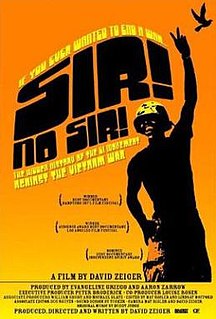
Sir! No Sir! is a 2005 documentary by Displaced Films about the anti-war movement within the ranks of the United States Armed Forces during the Vietnam War. The film was produced, directed, and written by David Zeiger. The film had a theatrical run in 80 cities throughout the U.S. and Canada in 2006, and was broadcast worldwide on: Sundance Channel, Discovery Channel, BBC, ARTE France, ABC Australia, SBC Spain, ZDF Germany, YLE Finland, RT, and several others.
Tod Ensign was an American veterans' rights lawyer and Director of Citizen Soldier, a non-profit GI and veterans rights advocacy group based in New York City. Ensign held two law degrees, a Master of Laws (LLM) from NYU and Juris Doctor (J.D.) from Wayne State University, as well as a BA from Michigan State University.
The abbreviation or acronym RITA stands for "Resistance Inside the Army", "Resister Inside the Army", or "Resist! Inside the Army".
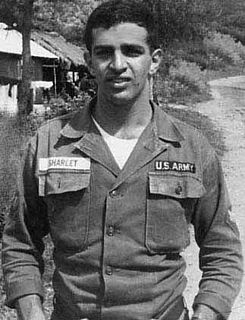
Jeff Sharlet (1942–1969), a Vietnam veteran, was a leader of the GI resistance movement during the Vietnam War and the founding editor of Vietnam GI. David Cortright, a major chronicler of the Vietnam GI protest movement wrote, "Vietnam GI, the most influential early paper, surfaced at the end of 1967, distributed to tens of thousands of GIs, many in Vietnam, closed down after the death of founder Jeff Sharlet in June, 1969."
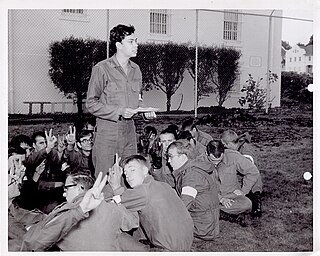
The Presidio mutiny, one of the earliest instances of internal military resistance to the Vietnam War, was a sit-down protest carried out by 27 prisoners at the Presidio stockade in San Francisco, California on October 14, 1968. The stiff sentences given out at court martials for the participants attracted international attention to the extent of sentiment against the war within the U.S. armed forces and the mutiny became "[p]erhaps the single best known event of the domestic GI movement".

F.T.A. is a 1972 American documentary film starring Jane Fonda and Donald Sutherland and directed by Francine Parker, which follows a 1971 anti-Vietnam War road show for GI's, the FTA Show, as it stops in Hawaii, The Philippines, Okinawa, and Japan. It includes highlights from the show, behind the scenes footage, local performers from the countries visited, and interviews and conversations with GIs "as they discuss what they saw in battle, their anger with the military bureaucracy, and their opposition to America's presence in Indochina." Called by Fonda "a spit and a prayer production" it was far from a big budget Hollywood movie, or even a well-funded documentary. While the movie "is raw," it "underscores how infectious the movement of the 60s and 70s was", and chronicles both the Tour itself as well as the soldiers who came to see it and "the local talent of organizers, labor unions and artist/activists" in the countries visited.
The Lawyers Military Defense Committee (LMDC) was a non-profit legal organization founded in 1970 by a group concerned that military members serving in Vietnam were unable to exercise their right to civilian counsel in courts-martial. LMDC existed for six years (1970–76) – two years in the combat zone of Vietnam, and for four years amidst disciplinary clashes inside US military forces in West Germany. During this period high caliber civilian representation and counseling by a cohort of young attorneys were provided free of charge country-wide, in often challenging and controversial cases for hundreds of service members, including scores of trial and post-trial proceedings. Initial logistical obstacles in Vietnam were ultimately resolved satisfactorily, so that communications with clients, other counsel, and the court could be accomplished pursuant to newly issued U.S. Army regulations, as were needs for access to military transport, billeting, and research facilities. In almost every instance representation by LMDC lawyers was welcomed by assigned military counsel. LMDC's operations in a war zone were unique. No undertaking of its kind has appeared in subsequent US conflicts.

The Concerned Officers Movement (COM) was an organization of mainly junior officers formed within the U.S. military in the early 1970s whose principal purpose was opposition to the U.S. involvement in the Vietnam War. Very quickly, however, it also found itself fighting for First Amendment rights within the military. It was initiated in the Washington, D.C. area by commissioned officers who were also Vietnam Veterans, but rapidly expanded throughout all branches and many bases of the U.S. military, ultimately playing an influential role in the opposition to the Vietnam War.

GI's Against Fascism was a small but formative organization formed within the U.S. Navy during the years of conscription and the Vietnam War. The group developed in mid-1969 out of a number of sailors requesting adequate quarters, but coalesced into a formal organization with a wider agenda: a more generalized opposition to the war and to perceived institutionalized racism within the U.S. Navy. Although there had been earlier antiwar and GI resistance groups within the U.S. Army during the Vietnam era, 'GI's Against Fascism' was the first such group in the U.S. Navy. The group published an underground newspaper called Duck Power as a means of spreading its views.
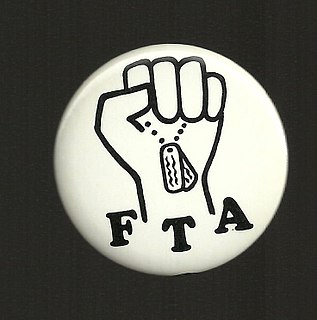
The Movement for a Democratic Military (MDM) was an antiwar and GI rights organization during the Vietnam War. Initially formed in late 1969 as a merger of sailors from San Diego and marines from the Camp Pendleton Marine Base in Oceanside, CA, it rapidly spread to a number of other cities and bases in California and the mid-West, including San Francisco, Long Beach Naval Station, El Toro Marine Air Station, Fort Ord, Fort Carson and the Great Lakes Naval Training Center. Heavily influenced by the Black Panther Party and the Black militancy of the times., it became one of the more radical GI organizations during that era and was investigated in 1971 by the House Committee on Internal Security.

GI coffeehouses were a consequential part of the anti-war movement during the Vietnam War era, particularly the resistance to the war within the U.S. military. They were mainly organized by civilian anti-war activists as a method of supporting antiwar and anti-military sentiment among GIs, but many GIs participated as well. They were created in numerous cities and towns near U.S. military bases throughout the U.S as well as Germany and Japan. Due to the normal high turnover rate of GIs at military bases plus the military's response which often involved transfer, discharge and demotion, not to mention the hostility of the pro-military towns where many coffeehouses were located, most of them were short-lived, but a few survived for several years and "contributed to some of the GI movement's most significant actions". The first GI coffeehouse of the Vietnam era was set up in January 1968 and the last closed in 1974. There have been a few additional coffeehouses created during the U.S. led wars in Iraq and Afghanistan.

The Stop Our Ship (SOS) movement, a component of the overall civilian and GI movements against the Vietnam War, was directed towards and developed on board U.S. Navy ships, particularly aircraft carriers heading to Southeast Asia. It was concentrated on and around major U.S. Naval stations and ships on the West Coast from mid-1970 to the end of the Vietnam War in 1975, and at its height involved tens of thousands of antiwar civilians, military personnel and veterans. It was sparked by the tactical shift of U.S. combat operations in Southeast Asia from the ground to the air. As the ground war stalemated and Army grunts increasingly refused to fight or resisted the war in various other ways, the U.S. “turned increasingly to air bombardment”. By 1972 there were twice as many Seventh Fleet aircraft carriers in the Gulf of Tonkin as previously and the antiwar movement, which was at its height in the U.S. and worldwide, became a significant factor in the Navy. While no ships were actually prevented from returning to war, the campaigns, combined with the broad antiwar and rebellious sentiment of the times, stirred up substantial difficulties for the Navy, including active duty sailors refusing to sail with their ships, circulating petitions and antiwar propaganda on board, disobeying orders, and committing sabotage, as well as persistent civilian antiwar activity in support of dissident sailors. Several ship combat missions were postponed or altered and one ship was delayed by a combination of a civilian blockade and crewmen jumping overboard.

Waging Peace in Vietnam: U.S. Soldiers and Veterans Who Opposed the War is a non-fiction book edited by Ron Carver, David Cortright, and Barbara Doherty. It was published in September 2019 by New Village Press and is distributed by New York University Press.
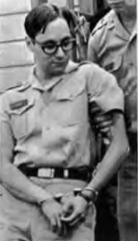
The court-martial of Howard Levy occurred in 1967. Howard Levy was a United States Army doctor who became an early resister to the Vietnam War. In 1967, he was court-martialed at Fort Jackson, South Carolina, for refusing an order to train Green Beret medics on their way to Vietnam. He said it "became clear to me that the Army [was using medics] to 'win hearts and minds' in Vietnamese villages - while still burning them to the ground in search-and-destroy missions." He considered the Special Forces "killers of peasants and murderers of women and children".
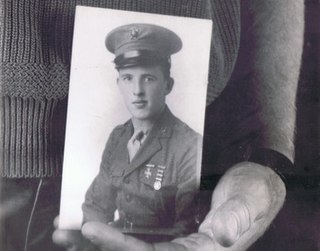
A Matter of Conscience: GI Resistance During the Vietnam War is an artist book published in 1992 at the time of the Addison Gallery of American Art exhibition, “A Matter of Conscience” and “Vietnam Revisited.” It contains oral histories of Vietnam era GIs gathered and edited by Willa Seidenberg and William Short and 58 photographs by William Short. Each oral history is complemented by a portrait in which the Vietnam veteran holds an object of some significance such as a newspaper clipping, a legal document, a book, or photograph. The large black and white photographs allow readers to see the veteran while reading the brief but moving oral histories to learn why they turned against the Vietnam War. The veterans' stories and portraits were collected over a five-year period and have been exhibited throughout the United States, Vietnam, Japan and Australia. A number of them were also included in the book Waging Peace in Vietnam: U.S. Soldiers and Veterans Who Opposed the War edited by Ron Carver, David Cortright, and Barbara Doherty. It was published in September 2019 by New Village Press.
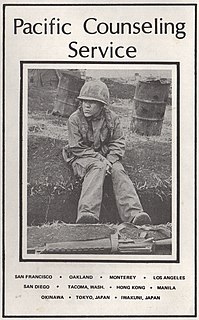
The Pacific Counseling Service (PCS) was a GI counseling service organization created by antiwar activists during the Vietnam War. PCS saw itself as trying to make the U.S. Armed Forces "adhere more closely to regulations concerning conscientious objector discharges and G.I. rights." The Armed Forces Journal, on the other hand, said PCS was involved in "antimilitary activities", including "legal help and incitement to dissident GIs." PCS evolved out of a small GI Help office started by a freshly discharged Air Force Sergeant in San Francisco, California in January 1969. The idea rapidly caught on among antiwar forces and within a year PCS had offices in Monterey, Oakland and San Diego in California, plus Tacoma, Washington. By 1971 it had spread around the Pacific with additional offices in Los Angeles, Hong Kong, Okinawa, the Philippines, as well as Tokyo and Iwakuni in Japan. Each location was established near a major U.S. military base. At its peak, PCS was counseling hundreds of disgruntled soldiers a week, helping many with legal advice, conscientious objector discharges and more. As the war wound down, ending in 1975, the offices closed with the remaining office in San Francisco printing its last underground newspaper in 1976.
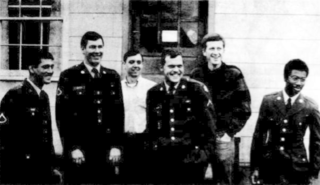
The Fort Lewis Six were six U.S. Army enlisted men at the Fort Lewis Army base in the Seattle and Tacoma, Washington area who in June 1970 refused orders to the Vietnam War and were then courts-martialed. They had all applied for conscientious objector status and been turned down by the Pentagon. The Army then ordered them to report for assignment to Vietnam, which they all refused. The Army responded by charging them with "willful disobedience" which carried a maximum penalty of five years at hard labor. The six soldiers were Private First Class Manuel Perez, a Cuban refugee; Private First Class Paul A. Forest, a British citizen from Liverpool; Specialist 4 Carl M. Dix Jr. from Baltimore; Private James B. Allen from Goldsboro, North Carolina; Private First Class Lawrence Galgano from Brooklyn, New York; and Private First Class Jeffrey C. Griffith from Vaughn, Washington. According to the local GI underground newspaper at Fort Lewis, this was the largest mass refusal of direct orders to Vietnam at the base up to that point in the war. Their refusal and subsequent treatment by the Army received national press coverage.

The GI Underground Press was an underground press movement that emerged among the United States military during the Vietnam War. These were newspapers and newsletters produced without official military approval or acceptance; often furtively distributed under the eyes of "the brass". They were overwhelmingly antiwar and most were anti-military, which tended to infuriate the military command and often resulted in swift retaliation and punishment. Mainly written by rank-and-file active duty or recently discharged GIs, AWOLs and deserters, these publications were intended for their peers and spoke the language and aired the complaints of their audience. They became an integral and powerful element of the larger antiwar, radical and revolutionary movements during those years. This is a history largely ignored, even hidden, in the retelling of the U.S. military's role in the Vietnam War.


















